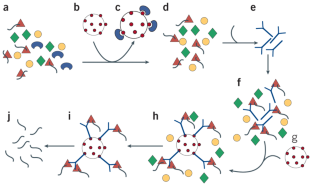Immunoprecipitation of mRNA-protein complexes (original) (raw)
- Protocol
- Published: 27 June 2006
- Fanyi Zeng1,2,
- Theresa J Kannanayakal1,
- Kalle Kilk3,
- Emelía Eiríksdóttir3,
- Ulo Langel3 &
- …
- James Eberwine1
Nature Protocols volume 1, pages 577–580 (2006)Cite this article
- 6890 Accesses
- 194 Citations
- 3 Altmetric
- Metrics details
Abstract
Immunoprecipitation of mRNA-protein complexes is a method that can be used to study RNA binding protein (RBP)–RNA interactions. In this protocol, an antibody targeting an RBP of interest is used to immunoprecipitate the RBP and any interacting molecules from a cell lysate. Reverse transcription followed by PCR is then used to identify individual mRNAs isolated with the RBP. This method focuses on examining an association between a specific RBP-mRNA complex, and it is best suited for a small scale screening of known or putative binding partners. It can also be used as a second, independent method to verify RBP-mRNA interactions discovered through more universal screening techniques. We describe the immunoprecipitation protocol in practical detail and discuss variations of the method as well as issues associated with it. The procedure takes three days to complete.
This is a preview of subscription content, access via your institution
Access options
Subscribe to this journal
Receive 12 print issues and online access
$259.00 per year
only $21.58 per issue
Buy this article
- Purchase on SpringerLink
- Instant access to full article PDF
Prices may be subject to local taxes which are calculated during checkout
Additional access options:
Figure 1: (a–c) Protein lysate, a, is incubated with protein A–agarose beads, b, to preclear any nonspecific binding of the lysate to the beads, c.

Similar content being viewed by others
References
- Zielinski, J. et al. In vivo identification of ribonucleoprotein-RNA interactions. Proc. Natl. Acad. Sci. USA 103, 1557–1562 (2006).
Article CAS Google Scholar - Zeng, F. et al. A protocol for PAIR: PNA-assisted identification of RNA-binding proteins in living cells. Nat. Protocols (2006) (doi:10.1038/nprot.2006.81).
- Tenenbaum, S.A., Carson, C.C., Lager, P.J. & Keene, J.D. Identifying mRNA subsets in messenger ribonucleoprotein complexes by using cDNA arrays. Proc. Natl. Acad. Sci. USA 97, 14085–14090 (2000).
Article CAS Google Scholar
Acknowledgements
We thank M. Maronski for help with culturing the neurons. This work was funded by grants AG9900 and MH58561 from the NIH to JE and the Swedish Science Foundation Grants Med and NT, and European Community Grant QLRT-2001-01989 to U.L.
Author information
Authors and Affiliations
- Department of Pharmacology, University of Pennsylvania School of Medicine, Philadelphia, 19104, Pennsylvania, USA
Tiina Peritz, Fanyi Zeng, Theresa J Kannanayakal & James Eberwine - Shanghai Institute of Medical Genetics, Shanghai Jiao Tong University, Shanghai, 200040, China
Fanyi Zeng - Department of Neurochemistry, Stockholm University, SE-106 91, Stockholm, Sweden
Kalle Kilk, Emelía Eiríksdóttir & Ulo Langel
Authors
- Tiina Peritz
You can also search for this author inPubMed Google Scholar - Fanyi Zeng
You can also search for this author inPubMed Google Scholar - Theresa J Kannanayakal
You can also search for this author inPubMed Google Scholar - Kalle Kilk
You can also search for this author inPubMed Google Scholar - Emelía Eiríksdóttir
You can also search for this author inPubMed Google Scholar - Ulo Langel
You can also search for this author inPubMed Google Scholar - James Eberwine
You can also search for this author inPubMed Google Scholar
Corresponding author
Correspondence toJames Eberwine.
Ethics declarations
Competing interests
The authors declare no competing financial interests.
Rights and permissions
About this article
Cite this article
Peritz, T., Zeng, F., Kannanayakal, T. et al. Immunoprecipitation of mRNA-protein complexes.Nat Protoc 1, 577–580 (2006). https://doi.org/10.1038/nprot.2006.82
- Published: 27 June 2006
- Issue Date: August 2006
- DOI: https://doi.org/10.1038/nprot.2006.82